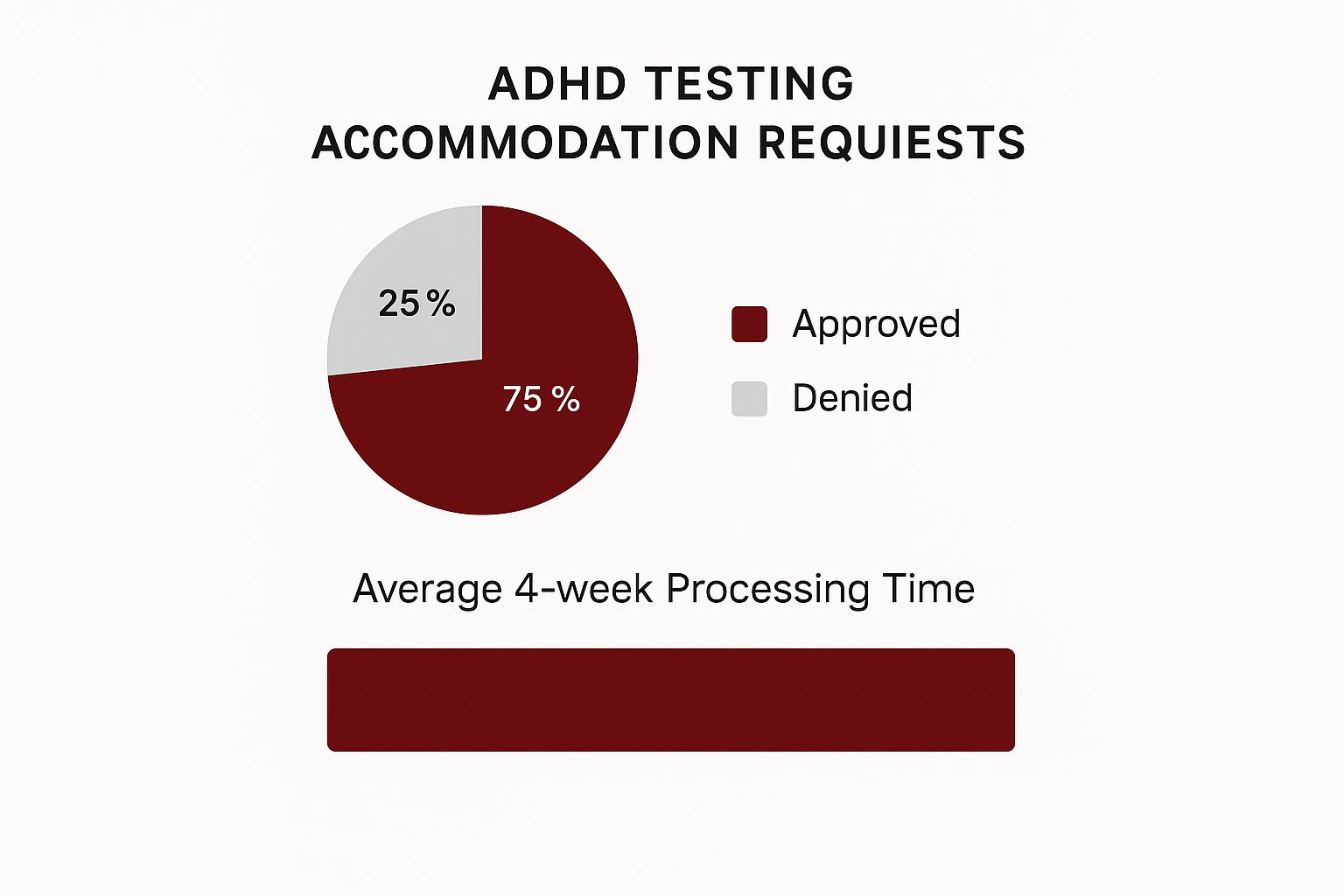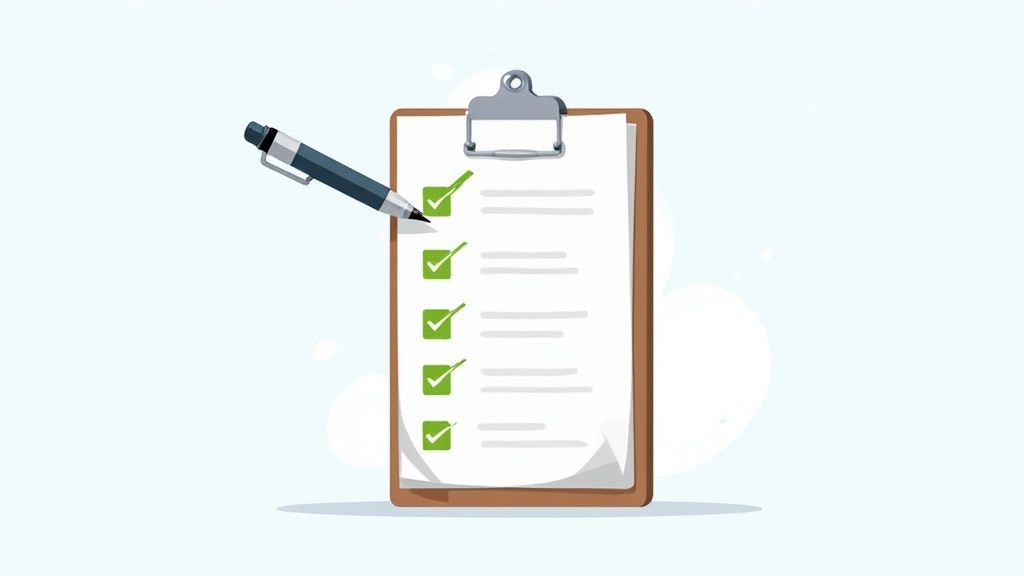Understanding Your Rights and What's Actually Available

Let's cut through the noise: having ADHD gives you legal protections for testing, but it's important to know what you can actually get. The Americans with Disabilities Act (ADA) is the cornerstone here. It ensures that tests measure what you know, not how your ADHD affects your performance. This applies across the board, from high school finals and the SAT to professional certifications like the bar exam. The entire point is to create a level playing field, not to give anyone an unfair edge.
A common myth is that good grades automatically disqualify you from receiving ADHD testing accommodations. That couldn't be further from the truth. You might be a straight-A student precisely because you've developed intense coping strategies, like studying three times longer than your friends or using specific tricks to stay focused during exams. These efforts don't cancel out your need for support; they actually prove it. Documenting these very strategies can strengthen your application by showing the extraordinary effort you put in just to keep up.
What Support Can You Actually Get?
While accommodations can vary, some are far more common than others. Knowing what testing bodies are most likely to green-light helps you set realistic expectations.
- Extended Time: This is the most frequently approved accommodation. It usually means 25% to 50% extra time, though in some well-documented cases, 100% extra time can be granted.
- A Separate or Private Room: A huge help for minimizing distractions, which is a major hurdle for many with ADHD. This provides a quiet, controlled space to focus.
- Extra Breaks: These are timed breaks that don't eat into your testing clock. They are a game-changer for managing focus, preventing burnout, and easing test anxiety.
ADHD is actually a primary reason people request accommodations for major exams. Data from large testing organizations reveals that a significant majority of applicants—around 86%—get the support they request. Before you apply, it's a good idea to see what's typically offered in different environments.
Common ADHD Testing Accommodations by Setting
Comparison of typical accommodations available across different testing environments
| Accommodation Type | High School | College | Professional Exams | Approval Rate |
|---|---|---|---|---|
| Extended Time | Very Common (often 50%) | Very Common (50% is standard) | Very Common (50-100%) | High (often >90%) |
| Separate/Private Room | Common | Common (but subject to space) | Common (but subject to space) | High, but logistical limits |
| Extra Breaks | Common | Very Common | Very Common | High |
| Use of a Computer | Varies by school policy | Common for essay portions | Common for certain exams | Moderate to High |
| Reader/Scribe | Less Common | Less Common | Rare, for specific needs | Low |
This table shows that core accommodations like extra time and separate rooms are consistently available, though access to a private room can depend on the testing center's capacity.
Legal Protections vs. Courtesy Offers
It's crucial to understand the difference between what an institution must provide under the ADA and what they might offer as a simple courtesy. For example, a public school district is legally required to provide accommodations under a 504 plan, but the specifics might look different from what a private company like ETS provides for the GRE.
For parents and younger students, grasping this distinction is key. A great place to start is by learning how to build a strong foundation with a 504 plan. You can get more information by reviewing our guide on creating a 504 plan template for ADHD. When you know your rights, you can advocate for yourself or your child with confidence, ensuring you get the support needed to truly show what you know.
Gathering Documentation That Actually Gets Results
This is where the process often gets frustrating. It’s not about whether you qualify for ADHD testing accommodations; it’s about successfully navigating the maze of paperwork. Every testing organization—from the College Board to professional licensing bodies—has its own specific, and sometimes confusing, list of requirements. Your success depends on submitting exactly what they ask for, precisely how they ask for it.
The good news is that most requests (75%) are ultimately approved. However, the average processing time is four weeks. These numbers highlight a key point: a strong, complete initial application is your best strategy for avoiding the delays and denials that can add stress to an already challenging situation.
Who Should Write Your Report?
Not all documentation is created equal. While your family doctor or therapist understands your day-to-day struggles, testing bodies typically want reports from specific specialists. For ADHD, this usually means a psychiatrist, a psychologist, or a neuropsychologist. Their evaluations carry more weight because they are trained in the specific diagnostic assessments these organizations require. A comprehensive neuropsychological evaluation is often the gold standard for securing accommodations on high-stakes exams like the SAT or GRE.
What Goes into a Winning Report?
A successful report is much more than just a diagnosis on a letterhead. It needs to tell a clear, evidence-based story about how your ADHD creates functional limitations in a testing environment. To make sure your documentation gets the green light, it should contain:
- A Clear Diagnosis: The report must state the specific diagnosis (e.g., ADHD, Combined Presentation) using official criteria, typically from the DSM-5.
- Comprehensive History: This includes your developmental, academic, and medical history, which provides essential context for the diagnosis. It’s particularly powerful to include notes about your struggles that existed even before you were formally diagnosed.
- Objective Test Data: This is non-negotiable. Your report must include scores from standardized, nationally normed tests that measure cognitive abilities, information processing, and executive functioning. Think of assessments like the WAIS-IV or the CPT-3. These scores provide the objective proof that testing bodies need to see.
- Specific Recommendations: The evaluator must explicitly recommend specific accommodations (like 50% extended time or a separate testing room) and justify why each one is necessary to offset the impact of your ADHD symptoms.
To give you a clearer picture, here’s a breakdown of what some of the major testing organizations look for.
| Organization | Required Tests | Timeline | Additional Requirements | Processing Time |
|---|---|---|---|---|
| College Board (SAT/AP) | Cognitive (e.g., WAIS-IV), Achievement (e.g., WIAT-III), ADHD-specific (e.g., CPT-3, Conners-3) | Within 5 years | Must include a clear diagnosis (DSM-5), history, and justification for each accommodation. | ~7 weeks |
| ETS (GRE/TOEFL) | Comprehensive neuropsychological or psychoeducational evaluation. | Within 5 years for adults; within 3 years for adolescents. | Report must be typed on letterhead, signed, and dated. Must detail functional limitations. | ~6 weeks |
| LSAC (LSAT) | A full psychoeducational or neuropsychological evaluation is preferred. | Varies, but generally within 5 years. | Requires a detailed history of accommodations. Previous accommodations are highly influential. | ~4-6 weeks |
| NBME (USMLE) | Full neuropsychological evaluation is the standard. | Within 3 years for most cases. | Must provide a thorough rationale linking test results to the requested accommodations. | ~6-8 weeks |
This table shows that while requirements overlap, the timelines and specific demands can differ. Always check the official website of the specific testing body for the most current guidelines before you begin.
A common pitfall is submitting a report that is too old. Most organizations require documentation to be recent, often within the last three to five years for adults. If your testing was done in childhood, you will almost certainly need an updated evaluation. This is where a service providing neuropsychological testing for academic accommodations can be a game-changer, ensuring your report meets current standards and directly addresses what reviewers are looking for.
Mastering the Application Process Like an Insider
With your comprehensive documentation ready, you're set to begin the application itself. It helps to think of this part as more of an art than a science. The way you frame your situation can genuinely influence the outcome, guiding a reviewer toward approving the ADHD testing accommodations you need. This isn't about finding loopholes; it's about communicating your reality clearly and persuasively.
The personal statement is where you get to connect the dots for the reviewer, linking your diagnosis to the specific problems you face in a testing environment. A common misstep is either sharing too many personal details or writing a statement that just sounds like a list of excuses. Your focus should be on providing concrete examples of your functional limitations.
Writing a Personal Statement That Connects
Your goal is to paint a vivid picture for the person reading your application. Instead of saying, "I have trouble focusing," describe what that actually feels like during a timed exam.
- Scenario: You find yourself re-reading the same short paragraph five times because every little noise in the room pulls your attention away.
- The "Why": This presents a clear case for needing a separate, quiet testing room.
- Scenario: You know the material backward and forward, but your processing speed makes it a real struggle to think through answers and fill in the bubbles before time runs out.
- The "Why": This offers a solid justification for needing extended time.
This method changes your request from a general ask into a logical solution for a well-documented issue. It's also very effective to explain the coping strategies you already use. If you're spending three times longer studying than your friends just to get an average grade, that's a powerful piece of evidence. It proves that your success comes at a great personal cost, reinforcing why you need support.
Working With Your Healthcare Provider
Your relationship with your evaluator doesn't just stop once you get the report. You should work with them to make sure their recommendation letter is as strong as it can be. Give them the specific guidelines from the testing agency so they can write their letter to meet those requirements. A generic letter simply won't be enough; they need to explicitly name the accommodations you need and tie them directly to your diagnostic test results.
If you get a request for more information, don’t panic—this happens all the time. Read what they're asking for carefully and work with your provider to give them a direct answer. It's often just a request for a simple clarification or a more detailed explanation. Responding quickly and completely is the best way to move forward.
College Students: Maximizing Campus Resources and Beyond
Figuring out college life with ADHD means you have to become an expert at using the support systems around you, and your first stop should always be the campus disability services office. The shift from high school, where an IEP or 504 plan might have followed you automatically, can be a shock. In college, the responsibility to get ADHD testing accommodations is all on you.
Think of the disability office as your strategic partner, not just a place to drop off paperwork. I always recommend scheduling a meeting before the semester even kicks off. This lets you talk through your documentation and discuss which accommodations have helped you in the past without the pressure of looming deadlines.
Building Your Campus Support Network
Being proactive is your most powerful tool. Don't just get your official accommodation letter and call it a day. For instance, if you get extended time on exams, make a point to connect with your professors during their office hours in the first week of classes.
You don’t have to share your specific diagnosis. Just hand them the letter from the disability office and say something like, "I wanted to introduce myself and figure out a plan for how we'll coordinate my accommodations for your exams this semester." This simple step changes a formal process into a personal, collaborative one.
This proactive mindset is critical, especially considering how many students are in the same boat. In U.S. higher education, ADHD is a common disability, with about 17% of undergraduates reporting they have ADHD or ADD. The surprising part? Only a small number of students with disabilities actually tell their schools, which means many are struggling without the support they're entitled to. You can dig into more of these numbers in a recent report about disability in higher education.
What to Ask For and How to Advocate
Different classes call for different kinds of support. For a dense, lecture-heavy history class, you might need permission to record lectures or get notes from a classmate. For a math or science course full of complex, multi-step problems, extended time on tests could be the most important accommodation you have.
Don't hesitate to ask for what you need, but be ready to explain why it helps with your specific challenges. For example, "Extended time helps me manage my processing speed on multi-step problems, ensuring I can show what I know without my ADHD getting in the way."
If a professor seems resistant, your first move should be to go back to the disability services office. They are there to advocate for you and can gently remind faculty of their legal obligations. For more specific ideas, check out our guide on ADHD accommodations for the classroom, which can help you figure out exactly what to ask for.
Conquering High-Stakes Professional and Standardized Exams
Taking on high-stakes exams like the MCAT, LSAT, or GRE when you have ADHD adds a layer of complexity that goes way beyond just knowing the material. Think of it as a mental marathon where managing your focus and keeping anxiety in check is just as important as remembering facts. Success isn't just about what you've studied; it’s about how you strategically use your approved ADHD testing accommodations on exam day.
A common situation is feeling overwhelmed by extended testing time. While getting 50% extra time sounds like a dream, it can quickly lead to mental burnout if you don't have a solid plan. The key is to practice with your accommodations. If you have extra time, you absolutely must take full-length practice tests with that exact timing. This helps build your stamina and teaches you how to pace yourself, so you can use your breaks to reset your focus instead of letting anxiety spiral.
Maximizing Your Support During the Exam
Making your accommodations work for you is a skill in itself. The strategies you'll need for a computer-based test are quite different from those for a paper-based one.
- Pacing with Extended Time: Don't just see it as more time. Break down long sections into smaller, more manageable chunks. Use the extra minutes to carefully double-check your work, not to second-guess every single answer.
- Leveraging Extra Breaks: Be intentional with your breaks. Use them to get up, stretch, or do a quick mindfulness exercise. Don’t wait until you’re completely fried to take one.
- Handling Technical Issues: For computer-based tests, find out the protocol for technical problems before you start. If your screen freezes, get the proctor's attention immediately. Your time should be paused, and you shouldn't lose your spot.
This need for personalized support is being recognized more and more on a global scale. Among students who get accommodations in secondary school tests, those with focus difficulties—a core challenge of ADHD—are frequently supported. This points to a worldwide move toward more inclusive testing to ensure everyone gets a fair shot. You can read more about these global assessment standards in the OECD's 2024 report on inclusive education03/en/pdf).
Ultimately, mastering these exams is about turning your accommodations into a real advantage. By practicing your strategies and learning how to manage your mental energy, you can walk into the testing center feeling prepared and confident. You can also learn more about how this works with our complete guide on extra time for testing, which is packed with more practical tips.
When Plans Fall Apart: Appeals and Smart Alternatives
Getting a denial for ADHD testing accommodations can feel like a punch to the gut, but it's not the end of your journey. It's easy to get discouraged, but try to see this as a strategic puzzle rather than a personal failure. The first thing you need to do is carefully read the reason for the denial. Testing organizations will give you specific feedback, and that information is your roadmap for what to do next.
More often than not, a denial isn't questioning your diagnosis itself but points to a problem with your documentation. You might hear that your diagnosis is too old or that your evaluation didn't clearly link your ADHD symptoms to the specific struggles you have in a timed testing situation. This is your cue to gather more focused proof.
Navigating the Appeals Process
The moment you receive a denial, the clock starts ticking. Most testing bodies have a very brief window for appeals, so you have to move quickly and thoughtfully.
- Beef Up Your Evidence: Don't just send in the same paperwork again. Get in touch with your evaluator and ask for a supplemental letter that directly counters the reasons for the denial. If they said your report was outdated, now is the time to schedule an updated neuropsychological evaluation.
- Rewrite Your Personal Statement: Your appeal is a chance to tell your story more clearly. For instance, if you were denied because you have good grades, explain the incredible effort and specific coping strategies you use to get them. This reframes your academic success not as a sign you don't need help, but as proof of your underlying difficulties.
- Find an Advocate: Sometimes, you need an expert in your corner. An educational psychologist, a disability rights lawyer, or a specialized advocacy service can help you put together a compelling appeal, often referencing legal protections under the ADA.
Exploring Smart Alternatives
Fighting an appeal isn't always the right move for everyone. It's worth considering if other options might be better for your timeline and mental well-being. For example, could you push back your test date to give yourself more time to get stronger documentation?
Some people discover that a less formal testing setup, if one exists, might work for them even without the official accommodations. The real objective is to find the most practical route to success for you, whether that means challenging the decision or finding a clever workaround.
Making Your Accommodations Work in the Real World
Getting your approval letter for ADHD testing accommodations feels like a massive victory, but it's really just crossing the starting line. Now comes the real test: learning how to use that support effectively when it counts. Many people are surprised to find that things like extended time or a separate room bring their own unique challenges. The goal isn't just to have accommodations; it's to make them a natural part of your strategy.
For instance, having 50% extra time sounds like a fantastic safety net, but it can easily become a recipe for mental burnout. A three-hour exam suddenly transforms into a four-and-a-half-hour marathon. If you haven't practiced, your focus can completely nose-dive in that final, crucial hour. Similarly, a "private" testing room isn't always the quiet sanctuary you might picture. You could still have to deal with hallway noise, the low hum of fluorescent lights, or a proctor's rustling papers.
Strategies for Test Day Success
The trick is to think about these real-world curveballs ahead of time and prepare for them. You don't want test day to be your first time trying out your new setup.
- Practice Your Pacing: You absolutely must take full-length practice exams using your exact time allotment. This is how you build the mental stamina for a longer test and figure out the best way to use those extra minutes. Should you spend more time wrestling with tough questions or save it for a final, thorough review? Only practice will tell you what works for you.
- Simulate Your Environment: Do your best to mimic your real testing conditions during practice runs. If you can't find a perfectly silent room, that might actually be a blessing in disguise. It's a chance to learn how to use earplugs effectively or practice techniques for refocusing when you get distracted.
- Plan Your Breaks: If you're granted extra or stop-the-clock breaks, map out how you'll use them. Don't just wait until you're completely frazzled. A planned two-minute break to stretch, close your eyes, and take a few deep breaths can be far more powerful than a panicked five-minute escape later on.
- Strategize Snacks and Hydration: A longer test means you need to think about fuel. Plan what you'll eat and drink during your scheduled breaks. Go for protein-rich snacks that deliver sustained energy, not sugary options that will lead to an energy crash halfway through.
Building Confidence and Managing Expectations
It's also important to manage the expectations of the people around you. Friends and family mean well, but they might not fully grasp the pressure you're under. You don't owe anyone a detailed explanation of your ADHD, but it can be helpful to let them know this is a challenging process and your focus is on preparation. True confidence comes from within, by proving to yourself through practice that you can succeed with the support you've rightfully earned.
At the Sachs Center, we know that getting accommodations is a critical step, but it’s not the final one. Our neuropsychological testing is created not only to help secure the support you need for exams like the SAT, ACT, or GRE but also to give you a deep understanding of your own cognitive profile. This knowledge is what empowers you to develop strategies that turn accommodations into real, measurable success. Learn more about our comprehensive neuropsychological testing services and take control of your testing experience.


